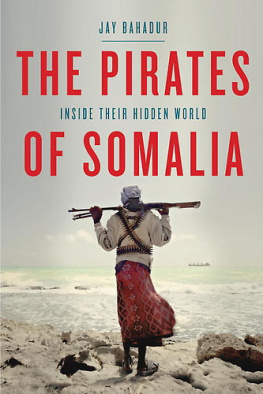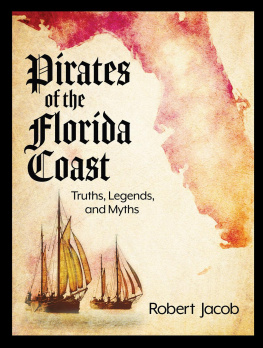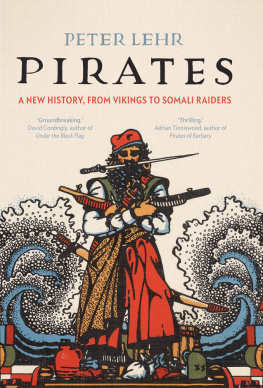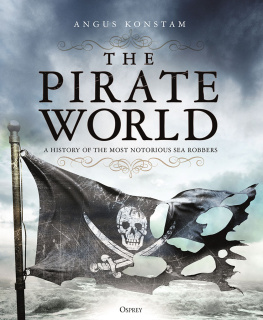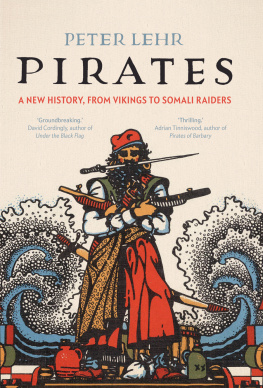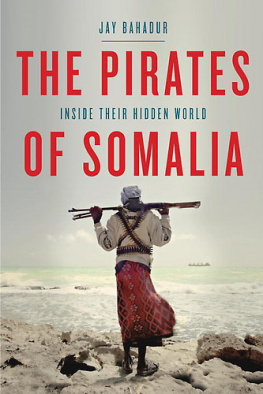Deadly Waters

JAY BAHADUR is a Canadian freelance journalist, who has published articles in The Times , The New York Times , Financial Times and the Globe and Mail. He has worked as a freelance correspondent for CBS News, advised the US State Department on Somali piracy, and has appeared on CNN, the BBC, and the Australian Broadcasting Corporation. Bahadur currently lives in Toronto, where he runs an international news website, Journalist Nation. Follow him on twitter (@PuntlandPirates) and www.jaybahadur.com
Deadly Waters
I NSIDE THE H IDDEN W ORLD OF S OMALIAS P IRATES
JAY BAHADUR

First published in Great Britain in 2011 by
PROFILE BOOKS LTD
3A Exmouth House
Pine Street
London EC1R 0JH
www.profilebooks.com
First published in Canada in 2011 by
HarperCollins Publishers Ltd
Copyright Jay Bahadur, 2011
1 3 5 7 9 10 8 6 4 2
Printed and bound in Great Britain by
Clays, Bungay, Suffolk
The moral right of the author has been asserted.
All rights reserved. Without limiting the rights under copyright reserved above, no part of this publication may be reproduced, stored or introduced into a retrieval system, or transmitted, in any form or by any means (electronic, mechanical, photocopying, recording or otherwise), without the prior written permission of both the copyright owner and the publisher of this book.
A CIP catalogue record for this book is available from the British Library.
ISBN 978 1 84668 363 3
eISBN 978 1 84765 436 6
The paper this book is printed on is certified by the 1996 Forest Stewardship Council A.C. (FSC). It is ancient-forest friendly. The printer holds FSC chain of custody SGS-COC-2061

To Ali, without whose infectious love for Africa this
book would not exist
Somalia

Expansion of Pirate Operations

Deadly Waters
Prologue
Where the White Man Runs Away
IT WAS MY FIRST TRIP TO AFRICA.
I arrived in Somalia in the frayed seat of a 1970s Soviet Antonov propeller plane, heading into the internationally unrecognized region of Puntland on a solo quest to meet some present-day pirates. The 737s of Dubai, with their meal services and functioning seatbelts, were a distant memory; the plane I was in was not even allowed to land in Dubai, and the same probably went for the unkempt, ill-tempered Ukrainian pilot.
To the ancient Egyptians, Punt had been a land of munificent treasures and bountiful wealth; in present times, it was a land of people who robbed wealth from the rest of the world. Modern Puntland, a self-governing region in northeastern Somalia, may or may not be the successor to the Punt of ancient times, but I was soon to discover that it contained none of the gold and ebony that dazzled the Egyptianssave perhaps for the colours of the sand and the skin of the nomadic goat and camel herders who had inhabited it for centuries.
The cabin absorbed the heat of the midday African sun like a Dutch oven, thickening the air until it was unbearable to breathe. Sweat poured freely off my skin and soaked into the torn cloth of my seat cover. Male passengers fanned themselves with the Russian-language aircraft safety cards; the women fanned their children. The high whine of the Antonovs propellers changed pitch as it accelerated along the Djibouti runway, building towards a droning crescendo that I had not heard outside of decades-old movies.
The stories I had heard of these planes did nothing to put me at ease: a vodka-soaked technician banging on exposed engine parts with a wrench; a few months prior, a plant-nosed landing at Bossaso airstrip after a front landing strut had refused to extend. Later, in Bossaso, I saw the grounded craft, abandoned where it had crashed, a few lackadaisical guards posted nearby to prevent people from stripping the valuable metal.
This flight was like a forgotten relic of the Cold War, a physical testament to long-defunct Somali-Soviet geopolitical ties that had disintegrated with the countries themselves; its Ukrainian crew, indentured servants condemned forever to ferry passengers along this neglected route.
Over the comm system, the Somali steward offered a prayer in triplicate: Allahu akbar, Allahu akbar, Allahu akbar, as the plane gained speed. The whine heightened to a mosquito-like buzz and we left the ground behind, setting an eastward course for Somalia, roughly shadowing the Gulf of Aden coastline.
* * *
As I approached my thirty-fifth weary hour of travel, my desire to socialize with fellow passengers had diminished, but on purely self-serving grounds I forced myself to chat eagerly with anyone throwing a curious glance in my direction. I had never met my Somali host, Mohamad Farole, and any friend I made on the plane was a potential roof over my head if my ride didnt show. Remaining alone at the landing strip was not an option; news travels around Somalia as fast as the ubiquitous cellphone towers are able to transmit it, and a lone white man bumming around the airstrip would be public knowledge sooner than I cared to contemplate.
When he learned that I was travelling to Garowe, Puntlands capital city, the bearded man sitting next to me launched into the unfortunate tale of the last foreigner he knew to make a similar voyage: a few months previous, a Korean man claiming to be a Muslim had turned up in the capital, alone and unannounced. Not speaking a word of Somali, he nonetheless succeeded in finding a residence and beginning a life in his unusual choice of adoptive homeland.
He lasted almost two weeks. On his twelfth day in Puntland, a group of rifle-toting gunmen accosted the man in broad daylight as he strolled unarmed through the streets. Rather than let himself be taken hostage, the Korean made a fight of it, managing to struggle free and run. He made it several metres before one of his bemused would-be captors casually shot him in the leg. The shot set off a hue and cry, and in the ensuing clamour the gunmen dispersed and someone helped the man reach a medical clinic. I later learned from another source that he was a fugitive, on the run from the Korean authorities. His thought process, I could only assume, was that Somalia was the last place on earth that his government would look for him. He was probably right.
* * *
Just a few months earlier, I had been a recent university graduate, killing the days writing tedious reports for a market research firm in Chicago, and trying to break into journalism with the occasional cold pitch to an unresponsive editor. I had no interest in journalism school, which I thought of as a waste of two of the best years of my lifeyears that I should spend in the fray, learning how to do my would-be job in places where no one else would go.
Somalia was a good candidate, jockeying with Iraq and Afghanistan for the title of the most dangerous country in the world. The country had commanded a soft spot in my heart since my PoliSci days, when I had wistfully dreamt of bringing the astounding democratic success of the tiny self-declared Republic of Somaliland (Puntlands western neighbour) to the worlds attention.
Next page

